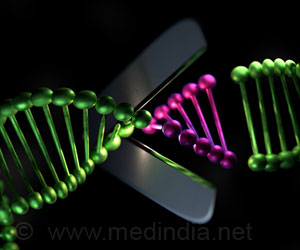
Advertisement
‘A less costly and more effective alternative molecule can make immunotherapy available to all types of cancers patients.’
- A newly developed immunotherapy molecule will make immunotherapy available to all cancer patients.
- Unlike other cancer therapies that patients must take in hospitals, patients will be able to take this at home.
- The novel compound is based on an antibody discovered in 2018 by Nobel Laureates James Allison and Tasuku Honjo.
-
APA
Dr. Trupti Shirole. (2022, August 19). Cancer Immunotherapy With a Novel Small Molecule Easily Available. Medindia. Retrieved on Aug 19, 2022 from https://www.medindia.net/news/healthwatch/cancer-immunotherapy-with-a-novel-small-molecule-easily-available-208323-1.htm.
-
MLA
Dr. Trupti Shirole. ” Cancer Immunotherapy With a Novel Small Molecule Easily Available”. Medindia. Aug 19, 2022. <https://www.medindia.net/news/healthwatch/cancer-immunotherapy-with-a-novel-small-molecule-easily-available-208323-1.htm>.
-
Chicago
Dr. Trupti Shirole. ” Cancer Immunotherapy With a Novel Small Molecule Easily Available”. Medindia. https://www.medindia.net/news/healthwatch/cancer-immunotherapy-with-a-novel-small-molecule-easily-available-208323-1.htm. (accessed Aug 19, 2022).
-
Harvard
Dr. Trupti Shirole. 2021. Cancer Immunotherapy With a Novel Small Molecule Easily Available. Medindia, viewed Aug 19, 2022, https://www.medindia.net/news/healthwatch/cancer-immunotherapy-with-a-novel-small-molecule-easily-available-208323-1.htm.
A small molecule developed by scientists at Tel Aviv University and the University of Lisbon may be a more practical and efficient substitute for an antibody currently used to treat a variety of tumors. The findings of this study are published in the Journal for Immunotherapy of Cancer.
A worldwide group of researchers is responsible for the ground-breaking discovery. They were led by Prof. Ronit Sachi-Fainaro, Head of the Center for Cancer Biology Research and Head of the Laboratory for Cancer Research and Nanomedicine at the Sackler Faculty of Medicine, Tel Aviv University, and Prof. Helena Florindo and Prof. Rita Guedes from the Research Institute for Medicines at the Faculty of Pharmacy, University of Lisbon.
“In 2018, the Nobel Prize in Medicine was awarded to James Allison and Tasuku Honjo for their contribution to the study of immunotherapy, the treatment of cancer through activation of the immune system. Honjo discovered that immune cells called T cells express the protein PD-1 which disables the T-cells’ own activity when it binds to the protein PD-L1 expressed in cancer cells. In fact, the interaction between PD-1 and PD-L1 allows cancer cells to paralyze the T cells, preventing them from attacking the cancer cells. Honjo developed antibodies that neutralize either PD-1 or PD-L1, thereby releasing the T cells to fight cancer effectively,” said Prof. Satchi-Fainaro, a 2020 Kadar Family Award recipient.
What is Cancer Immunotherapy?
Immunotherapy has the potential to significantly enhance patient outcomes without the unpleasant side effects associated with conventional therapies like chemotherapy. Antibodies against the PD-1/PD-L1 proteins are approved for clinical use. They were promising for the fight against cancer.
However, the antibodies are expensive to make. So not all patients can get them. Additionally, as they are too big to penetrate, the therapy does not affect all components of solid tumors. It is especially difficult to reach the less accessible and less exposed portions of the tumor. Now, researchers from the Universities of Lisbon and Tel Aviv have employed bioinformatic and data analytic methods to discover a more compact and intelligent replacement for these antibodies.
Newly Discovered Molecule vs Cancer Immunotherapy
“Post-doctoral researcher Dr. Rita Acúrcio started with thousands of molecular structures, and by using computer-aided drug design (CADD) models and databases, we narrowed down the list of candidates until we reached the best structure. In the second stage, we confirmed that the small molecule controls tumor growth as effectively as the antibodies – it inhibits PD-L1 in animals engineered to have human T cells. In other words, we have developed a molecule that can inhibit PD-1/PD-L1 binding and remind the immune system that it needs to attack cancer. Moreover, the new molecule has some major advantages over the antibody treatment. First of all, the cost: since the antibody is a biological rather than a synthetic molecule, it requires a complex infrastructure and considerable funds to produce, costing about $200,000 per year per patient. In contrast, we have already synthesized the small molecule with simple equipment, in a short time and at a fraction of the cost. Another advantage of the small molecule is that patients will probably be able to take it at home, orally, without the need for IV administration in the hospital,” said Prof. Satchi-Fainaro.
In addition to accessibility issues, tests demonstrate that the tiny molecule enhances immune cell activation within the solid tumor mass.
“The surface area of a solid tumor is heterogeneous. If there are fewer blood vessels in a particular area of the tumor, the antibody will not be able to get inside. The small molecule, on the other hand, diffuses and is therefore not entirely dependent on the tumor’s blood vessels or on its hyperpermeability. I believe that in the future, the small molecule will be commercially available and will make immunotherapy affordable for cancer patients,” said Prof. Satchi-Fainaro.
Source: Medindia
Please use one of the following formats to cite this article in your essay, paper or report:
Advertisement




